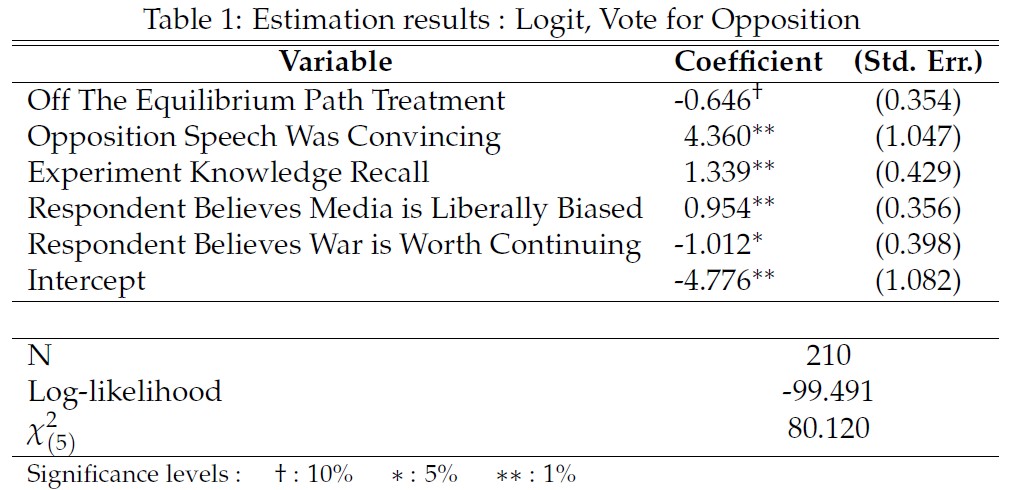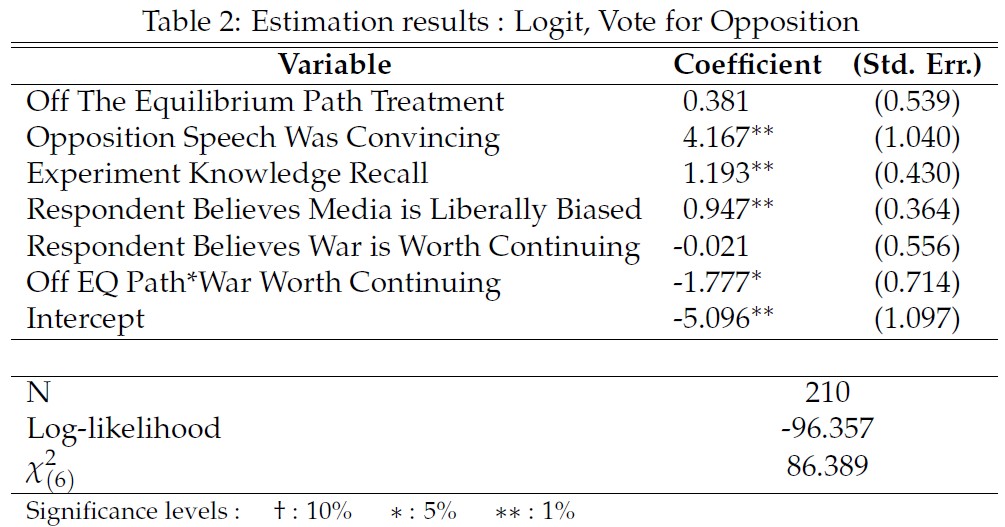The Experimental Prediction
In past posts I outlined two different equilibria from my Wartime Elections game which sets the stage in the first chapter of my dissertation. See here for the Opposing Victory equilibrium and here for the Prolonging Defeat equilibrium. In the game the public is given two signals in the context of an election where the nation is engaged in a salient war. Nature selects the true value for whether or not the war is worth fighting and then sends a noisy signal to Media. The Mass Media, is assumed to be unbiased and reports Nature’s noisy signal. The Media gives the public a general idea of whether or not the current war is worth continuing, but they can be wrong. The second signal is from the Opposition Party who is biased in favor of getting elected, but also cares about some objective national welfare. The Opposition Party is assumed to know the true state of the war and tells the public that if elected they will continue or end the war. At the end of the game the public has to make the decision of whether to reelect the Incumbent or elect the Opposition Party. The model also allows the public to vary on whether they prefer the Incumbent or the Opposition on the economy/domestic issues. In short, when the Opposition Party states that they will end the war, they politicize the issue and the public makes their decision based on whether or not they believe the war is worth continuing. However, if the Opposition fails to politicize the war, the public’s decision is solely based on their preference on the economy. This simple model produces many equilibria, but I focus on two interesting and tragic outcomes.
Prolonging Defeat
The equilibrium I test using an experiment is called Prolonging Defeat. In this case, the true state of the war is not worth fighting, in the sense that the costs outweigh the benefit. The Media mistakenly reports that the war is worth continuing. The public favors the Opposition on the economy/domestic issues. In this case, if the Opposition politicizes the war and the public believes it to be worth fighting, they are likely to lose the election. However, if the Opposition states they will continue the war then the public cannot differentiate their choice based on different foreign policies. Rather they make their decision based on the economy. This is exactly what happens and the Opposition Party wins the election, continuing a war that wasn’t worth fighting. This tragic case is driven by both the Media’s inaccuracy and the Opposition’s strategic behavior. An observable implication drawn from this equilibrium is that those voters who believe the current war is worth continuing would be less likely to vote for the Opposition Party if they state they will end the war if elected. The experimental design is intended to test this exact prediction.
Experimental Design
The design of the experiment is simple. All respondents first read a vignette which sets the stage for the election. They are given a series of economic indicators (GDP Growth, Unemployment) that show the economy is struggling. Then they are given a series of expert statements regarding the war. The vignette includes war casualties, financial costs, strategic/national security importance, and other information which paints of a picture of a war that is worth continuing. In fact, the respondent is told that the Mass Media has generally reported that the war is worth continuing. However, the vignette also leaves some doubt in the respondent’s mind using expert statements that warn that the war is not yet over and will require more work and higher costs. This vignette is designed to give respondents information that paints a picture of a struggling economy and a relatively successful war, just as in the Prolonging Defeat equilibrium.
Respondents are then randomly given one of two treatments.
On The Equilibrium Path Treatment
The first is a speech by the Opposition Party focusing on how poorly the Incumbent’s policies have been on the economy and emphasizing how they will do better. In this speech the Opposition candidate also states that they will continue the successful war policy, thus failing to politicize the conflict.
Off The Equilibrium Path Treatment
The second is a speech by the Opposition candidate focusing on the war. The candidate highlights the parts of the early vignette that paint the war in a negative light. For example, the Opposition highlights casualties and future economic costs. They also discuss how the was isn’t vital to national security. They state they will end the war if elected. Of course they also highlight the economy as well, but primarily focus on the war.
Prediction
As stated above, the model predicts that those respondents who believe the war is worth continuing would be less likely to vote for the Opposition Party Candidate if they advocate putting an end to the war. Below I will highlight some preliminary results from the experiment. Thus far, I have only received about 200 respondents – not enough to say anything definitive, but I couldn’t resist running some models, now that the semester is coming to an end.
Results
The simplest way to look at the results is to treat each treatment as a mini-election and look to see if the treatments play a role in who wins. With only 200 respondents, and about 100 respondents for each treatment, it is hard to make any generalizations. When a simple cross tabulation is conducted using the treatment conditions and the vote choice, the incumbent wins both elections, but does receive less votes when the Opposition Party chooses not to politicize the war. However, the difference in treatments does not approach statistical significance with standard tests like Kendell’s Tau-b. However, when the responses are combined it is possible to run a Logistic Regression using vote choice as the dependent variable.
Table 1 is a Logistic Regression with 210 respondents. The dependent variable is whether or not the respondent voted for the Opposition Candidate. It is clear that if the respondent read the speech where the Opposition states they will end the war, they are less likely to vote for the Opposition – the p-value is 0.068. It is also clear that if the Opposition’s speech was convincing the respondent is more likely to vote for the Opposition. Just as the model predicts if the respondent believed the war was worth continuing they are less likely to vote for the Opposition. These initial results seem to show that the treatment has a statistically significant result. Table 2 sheds more light on the picture.
The primary difference in Table 2 is an interaction effect between the treatment (Off the Equilibrium Path) and whether or not the respondent believed the war was worth continuing. Below Table 2 is a cross tabulation containing the predicted probabilities from the interaction effect. When the Opposition Party does not politicize the war (treatment = 0 or on the EQ Path) there is no difference in the probability for whether the Opposition gets elected depending on whether the respondent believes the war is worth continuing – the probability is about 77%. However, when the Opposition Party politicizes the war (treatment = 1 or off the EQ Path) their probability for winning the election drastically decreases from 83% to about 45% when the respondent believes the war is worth continuing! This is exactly what the model would predict under these conditions.
Of course these are very, very preliminary results and there are no where near enough respondents to invoke the law of large numbers or be secure in the findings. But the results are interesting for the first trial. Next semester I hope to add another 500 or more respondents to the data set. There are also some issues with how long well the respondents payed attention to the vignettes. If I reduce the sample to respondents that spend 1 minute or more on each vignette the results become more stark, but about 50 respondents get dropped from the data.
Thus, while there is more work to be done, the first set of results look promising.


